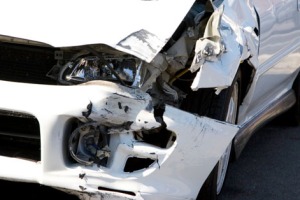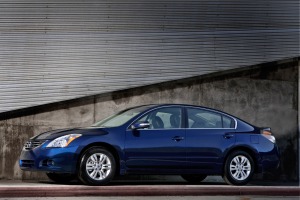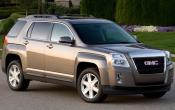
A growing number of people are dropping their auto insurance to try to save money, according to a recent study by the Insurance Research Council (IRC). If the current rate of unemployment continues, the IRC estimates that the national uninsured rate will climb from 13.8 percent in 2007 to 16.3 percent in 2010. With that many people driving without coverage, it's dangerous to be uninsured. But how much car insurance do you really need?
If you're like many people feeling the pinch, your inclination is to get the bare minimum of insurance coverage required by the law in your state. That's a good place to start, though those minimums may not fully protect you -- or your assets -- if you file a claim. We recommend getting more than the minimum coverage unless you are driving a beater and have no assets to protect.
Every state in the nation, except for New Hampshire and Wisconsin, requires that you have liability insurance, and that mandatory coverage varies according to state.
In the chart below, minimum liability limits are read as follows (in thousands of dollars):
- Bodily injury liability for one person in an accident
- Bodily injury liability for all people injured in an accident
- Property damage liability for one accident
So, for Alabama, the minimum requirements are $25,000 of bodily injury liability for one person, $50,000 bodily injury liability for all people and $25,000 property damage liability. Personal Injury Protection (PIP), or Medical Payments (MedPay) in some states, pays for your own medical expenses, any lost wages and whatever other costs may arise when you're injured in an accident. It usually pays about 80 percent of your losses, and it also pays a death benefit. PIP is required in: Arkansas, Delaware, Florida, Hawaii, Kansas, Kentucky, Maryland, Massachusetts, Michigan, Minnesota, New Jersey, New York, North Dakota, Oregon, Pennsylvania and Utah.
Some states also require you to purchase car insurance that will cover your own medical expenses, pain and suffering losses and, in some states, car damage in the event that the other motorist is at fault and is either uninsured or underinsured. See the chart below to find out if this applies to you.
State |
Liability limits |
Uninsured/Underinsured motorist coverage required? |
Alabama |
25/50/25 |
No |
Alaska |
50/100/25 |
No |
Arizona |
15/30/10 |
No |
Arkansas |
25/50/25 |
No |
California |
15/30/5 |
No |
Colorado |
25/50/15 |
No |
Connecticut |
20/40/10 |
Yes |
Delaware |
15/30/10 |
No |
|
25/50/10 |
Yes |
Florida |
10/20/10 |
No |
Georgia |
25/50/25 |
No |
Hawaii |
20/40/10 |
No |
Idaho |
25/50/15 |
No |
Illinois |
20/40/15 |
Yes |
Indiana |
25/50/10 |
No |
Iowa |
20/40/15 |
No |
Kansas |
25/50/10 |
Yes |
Kentucky |
25/50/10 |
No |
Louisiana |
10/20/10 |
No |
Maine |
50/100/25 |
Yes |
Maryland |
20/40/15 |
Yes |
Massachusetts |
20/40/5 |
Yes |
Michigan |
20/40/10 |
No |
Minnesota |
30/60/10 |
Yes |
Mississippi |
25/50/25 |
No |
Missouri |
25/50/10 |
Yes |
Montana |
25/50/10 |
No |
Nebraska |
25/50/25 |
No |
Nevada |
15/30/10 |
No |
New Hampshire |
Not required 25/50/25 |
Yes |
New Jersey |
15/30/5 |
Yes |
New Mexico |
25/50/10 |
No |
New York |
25/50/10 |
Yes |
North Carolina |
30/60/25 |
Yes |
North Dakota |
25/50/25 |
Yes |
Ohio |
12.5/25/7.5 |
No |
Oklahoma |
25/50/25 |
No |
Oregon |
25/50/10 |
Yes |
Pennsylvania |
15/30/5 |
No |
Rhode Island |
25/50/25 |
Yes |
South Carolina |
25/50/25 |
Yes |
South Dakota |
25/50/25 |
Yes |
Tennessee |
25/50/10 |
No |
Texas |
25/50/25 |
No |
Utah |
25/65/15 |
No |
Vermont |
25/50/10 |
Yes |
Virginia |
25/50/20 |
Yes |
Washington |
25/50/10 |
No |
West Virginia |
20/40/10 |
Yes |
Wisconsin |
Not required 25/50/10 |
Yes |
Wyoming |
25/50/20 |
No |
Even though each state has minimum (or no) requirements for bodily injury liability, it is probably in your best interest to purchase higher limits. If someone else is injured and you're at fault, the minimum liability coverage may not cover their medical expenses, in which case their attorney will most likely come after your assets. It is generally recommended that you purchase 100/300 limits of bodily injury liability. On the other hand, if your personal assets don't amount to much, you don't have a whole lot for them to bother about, so the minimum requirements might actually suit you and will save you some much-needed cash.
Besides various forms of liability insurance, there is collision and comprehensive auto insurance coverage to consider. Collision covers damage to the policyholder's car resulting from running into anything, be it another car, a fire hydrant, or a light post. Comprehensive coverage takes care of your car in the case of theft, fire, falling objects, explosions, or other unexpected problems.
Collision and comprehensive coverage are required in most lease contracts, and are essential if you own an expensive car. If you're driving an old rattletrap, on the other hand, and the sum of your premium and your deductible are close to or exceed the worth of your vehicle, you might want to consider doing without this coverage.
Before you purchase any type of auto insurance coverage, be sure to study your other insurance policies so you don't end up paying for something you don't need. If you have a decent health insurance plan, you might get away with purchasing the bare minimum personal injury protection coverage- or none at all if your state doesn't require it. However, you might end up paying a co-pay and deductible that wouldn't apply if you have PIP or MedPay.
Uninsured or underinsured motorist coverage might also be a wise buy, even if you have full medical coverage, as it can pay for your pain and suffering damages. If you belong to an organization that offers roadside assistance, you don't need to purchase that through your insurer. The same thing applies for mechanical breakdown insurance if you own a newly financed or leased vehicle which is still covered under warranty.
It's easy to be resentful of the money spent on insurance. Keep in mind that auto insurance will most likely come to your rescue at some point, so it's imperative to purchase a worthwhile policy. Know what coverage you must have and know what additional coverage fits your lifestyle. Then if trouble strikes, you'll be ready.








